#also also! the notes are a rough imitation of the title song's notes but i kinda botched it haha
Photo
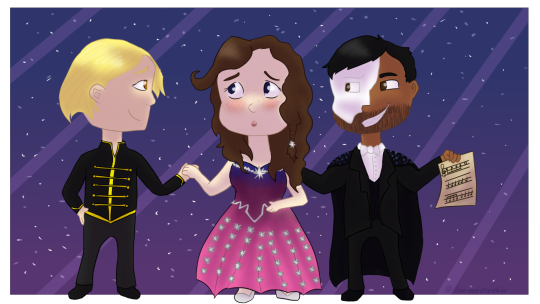
Say you’ll share with me one love, one lifetime...
Something for the con over at @selfshipping-port! I have an AU of my ot3 ship as characters from my favorite musical, and I figured the cosplay event would be the perfect chance to show it off! So here’s me and my alien partners cosplaying as the main trio from PO//TO!
Hope you like it <3
[Please only reblog if you’re a self ship blog - I’m too shy to want my stuff in the main fandom tags ^^”]
#selfship con 2020#self shipping#selfship community#self ship art#f/o x s/i#self ship community#self ship con 2020#whew this took me like three days#my laptop crashed three times mid-drawing#and don't look too closely or you'll see how i lost focus at some point lol#but even though there's a lot of flaws i'm kinda proud!! this is the biggest thing i've drawn in months#and i never draw people so the fact that i did now is a lot for me haha#but oh god jae's dress killed me...... never drawing christine's dresses again#and i forgot the tiara too darn it#anyway i love two (2) time traveling aliens#also also! the notes are a rough imitation of the title song's notes but i kinda botched it haha#but this was super fun to draw!!#picture.img#made of stardust.png#ot3: time stands still#my aus
9 notes
·
View notes
Text
i just wrote up a very barebones transcript of all the geralt & jaskier scenes in ‘four marks’, because i can’t find any online, and it took me like an hour so i might as well share it
it only takes note of action that interrupted dialogue, cuz i just wanted a reference for the dialogue, and it also only covers their actual conversation in the first scene. but other than that it should be accurate. i used netflix subtitle spelling for names
>>>
JASKIER: I love the way you just sit in the corner and brood.
GERALT: I’m here to drink alone.
JASKIER: Good, yeah, good. No one else hesitated to comment on the quality of my performance, except… for you. Come on. You don’t want to keep a man with bread in his pants waiting. You must have some review for me. Three words or less.
GERALT: They don’t exist.
JASKIER: Whaaat don’t exist?
GERALT: The creatures in your song.
JASKIER: And how would you know? … Oh, fun. White hair… big old loner, two very, very scary-looking swords, I know who you are. You’re the Witcher, Geralt of Rivia. Called it!
>>>
JASKIER: Ah. Need a hand? I’ve got two. One for each of the, uh, devil’s horns.
GERALT: Go away.
JASKIER: I won’t be but silent back-up. (pause) Look, I heard your note, and yes, you’re right, maybe real adventures would make better stories. And you, sir, smell chock-full of them. Amongst other things. I mean, what is that? Is that onion? It doesn’t matter. Whatever it is, you smell of death and destiny. Heroics and heartbreak.
GERALT: It’s onion.
JASKIER: Right, yeah, yeah. Ooh, I could be your barker, spreading the tales of Geralt of Rivia, the– the Butcher of Blaviken!
GERALT: Come here.
JASKIER: Yeah?
(GERALT punches JASKIER in the stomach. JASKIER groans and wheezes.)
GERALT: Come on, Roach.
>>>
JASKIER: Reading between the lines, and the gut punches, chum, I’d say you have got a bit of a… an image problem. Were I to join on this… feat to defeat the devil of Posada, I could relieve you of that title. All the North would be too busy singing the tales of Geralt of Rivia, the– the White Wolf, or– or something.
GERALT: Butcher is right.
JASKIER: Do you mind if I hop up there with you? It’s just, I’m not really wearing the right kind of footwear–
GERALT: Don’t touch Roach.
JASKIER: –Yeah, right.
JASKIER: You know, the elves called this Dol Blathanna, before bequeathing it to the humans and retreating to their golden palaces in the mountains. There I go again, just… delivering exposition. … Geralt? Geralt? Geralt, wh-where are you going? Geralt, don’t leave me. Hello? What are we looking for again?
GERALT: Blessed silence.
JASKIER: Yeah, I don’t really go in for that. Have you, uh, have you ever hunted a devil before, Geralt?
GERALT: Devils don’t exist.
JASKIER: Right. Obviously. Then, uh, then what are we doing?
GERALT: Sometimes there’s monsters, sometimes there’s money. Rarely both. That’s the life.
(GERALT gets hit by something.)
GERALT: Shit!
JASKIER: Act Two begins! What was that? Looks like a tiny cannonball from a… Oh my gosh. ... Geralt, it is a devil. Ohhh, I have to see this magical, this mythi–
(JASKIER gets hit in the forehead, and passes out.)
TORQUE: Leave me be!
GERALT: You talk.
TORQUE: Of course I talk!
GERALT: What happened with you? Your mother fuck a goat?
TORQUE: I am Torque the Sylvan, a rare and intelligent creature!
GERALT: You’re a dick. With balls.
TORQUE: Balls I got from humans, who left out filled with iron, meant to poison me!
GERALT: Ow!
TORQUE: Did your mother fuck a snowman?
GERALT: You are intelligent, I’ll give you that. So I won’t kill you. But you can’t stay here.
TORQUE: Neither can you.
(Something hits GERALT in the head.)
>>>
JASKIER: This is the part where we escape.
GERALT: This is the part where they kill us.
JASKIER: Who’s they?
ELF WOMAN: (in Elder) Beast!
GERALT: Elves.
JASKIER: Oi, that’s my lute! Give that back! Quick, Geralt. Do your– your witchering–
GERALT: Shut up!
ELF WOMAN: (in Elder) You shut up!
JASKIER: Oh, my Elder speech is rough, I only got part of that.
ELF WOMAN: (in English) Humans, shut up.
JASKIER: (in Elder) Ah, got it, thanks so much.
ELF WOMAN: Do you wanna die right now?
GERALT: As opposed to later?
JASKIER: No, please, not the lu–!
GERALT: Leave off! He’s just a bard.
ELF WOMAN: You don’t deserve the air you breathe. Everything you touch you destroy.
JASKIER: You hide in your golden palaces. You beat a bound man, too scared to even look him in the eye!
ELF WOMAN: Do you like my palace? Hmm? Does it live up to the tales you humans tell?
(GERALT headbutts her. She falls back, coughing.)
JASKIER: (laughs) Yeah, take that, pointy. … Wait, what’s–what’s wrong with her?
FILAVANDREL: She’s sick.
JASKIER: Oh, and who’s this?
TORQUE: He’s Filavandrel, king of the elves.
FILAVANDREL: Not a king. Not by choice.
GERALT: You were stealing for them.
TORQUE: I felt for them. They were forced out of Dol Blathanna.
JASKIER: Forced out? No, they chose–
FILAVANDREL: Do you know anyone that would choose to leave their home? To starve? To have a Sylvan steal for them?
TORQUE: Toruviel, no one was supposed to get hurt.
TORUVIEL: What’s two humans in the ground when countless elves have died?
GERALT: One human. And you can let him go.
FILAVANDREL: And Posada will learn that we’ve been stealing. The humans will attack. Many will die, on both sides.
GERALT: The lesser evil. No matter what you choose, you’ll come out bloody, and hating yourself. Trust me.
FILAVANDREL: That’s the problem. I can’t. This is necessary.
GERALT: I understand. As long as you understand that it won’t be long before you follow me in death.
FILAVANDREL: Yes, because they’ve pushed us from viable soil. Even chaos is polluted. Synthetically enhanced so humans can make magic.
GERALT: Chaos is the same as it’s always been. Humans just adapted better.
FILAVANDREL: You say adapt, and I say destroy.
GERALT: You are choosing to starve. You’re cutting off your ear to spite your face.
FILAVANDREL: You think this is about pride? My elders worked with humans, and got robbed of all they had. And when they fought back, they were slaughtered. “The Great Cleansing”, humans call it. I call it digging a mass grave for everyone I loved. And now the humans proudly watch these very fields grow, our babies fertiliser for their grain. I don’t wish to bury anyone else. I was once Filavandrel of the Silver Towers. Now I’m Filavandrel of the Edge of the World. If I bring my people down from these mountains, it would mean bowing to human sovereignty. They’ll make slaves of us. Pariahs of half-blood children.
GERALT: Then go somewhere else. Rebuild. Get strong again. Show the humans that you are more than what they fear you to be.
FILAVANDREL: Like you, Witcher?
GERALT: I have learned to live with them. So that I may live.
TORUVIEL: Please, my King. There are others. A new generation. Evellien who wish to fight. Let us take back what’s ours. Starting now.
TORQUE: Wait!
FILAVANDREL: Torque, stand aside.
TORQUE: The Witcher could’ve killed me. But he didn’t. He’s different. Like us.
GERALT: If you must kill me, I am ready. But the Sylvan’s right. Don’t call me human.
>>>
JASKIER: Credit where credit is due, that whole reverse psychology thing you did on them was brilliant, by the way. (imitates Geralt) “Kill me, I’m ready”. … That’s the conclusion. They just let us go, and you give all of Nettly’s coin to the elves.
GERALT: Filavandrel’s lute not gift enough for you?
JASKIER: Yeah, she is a bit sexy, isn’t she? I do have respect for Filavandrel. He survived the Great Cleansing once. Who knows? Maybe he can do it again. Be reborn. (singing) Will the elf king heed what the witcher entreats? Is history a wheel doomed to repeat? No, that’s– that’s shit.
GERALT: This is where we part ways, bard, for good.
JASKIER: Look, I promised to change the public’s tune about you. At least allow me to try.
(JASKIER sings the opening verses of Toss A Coin.)
JASKIER: (singing) And so cried the Witcher, “He can’t be bleat–”
GERALT: That’s not how it happened. Where’s your newfound respect?
JASKIER: Respect doesn’t make history.
(JASKIER continues to sing Toss A Coin.)
GERALT: Hmm.
#the witcher#geralt of rivia#jaskier#the witcher transcript#yelling at clouds#didn't realise spn was spoiling me so with having full scripts up on the wiki
27 notes
·
View notes
Text
51. bosko in person (1933)
release date: february 11th, 1933
series: looney tunes
director: hugh harman and friz freleng
starring: johnny murray (bosko), rochelle hudson (honey)
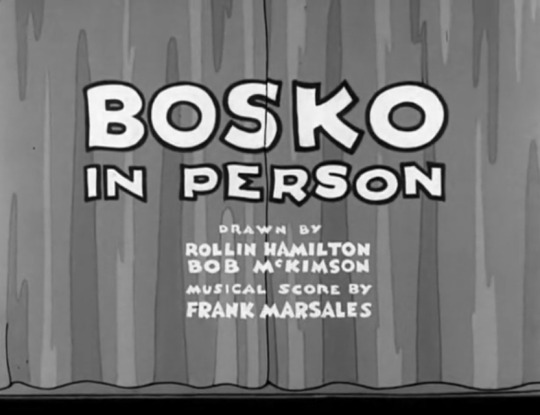
it’s back to bosko in bosko in person! it’s a plotless cartoon, with bosko and honey giving us boundless entertainment.
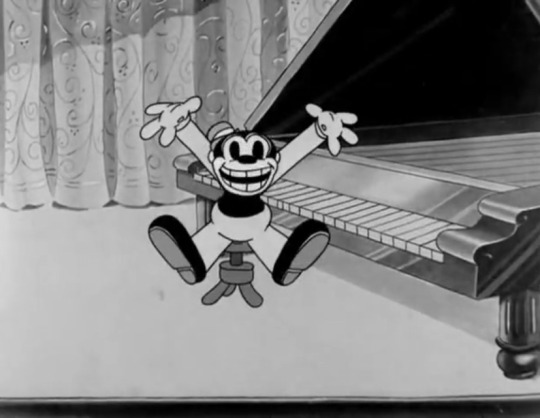
the title card curtain peels away to reveal an asbestos curtain, which goes up in flames (foreshadowing i wonder?) to reveal bosko banging out “whistle and blow your blues away” on the piano, the current looney tunes theme song for the 1932-1933 season. he recognizes us and greets “howdy, folks!” before going back to tickle the ivory.
honey makes her entrance, snapping and dancing along to the music as the two banter. immediately, they launch into a complicated, cute, and endearing dance routine, making a regular fred astaire and ginger rogers of themselves. though the bosko dance scenes are everywhere, i really enjoy this one! it feels more complex than usual. i’m sure friz’s co-directorial credit has something to do with it.

a “gee bosko, you’re swell!” from honey turns bosko bashful, and he dedicates a song to her, “i love her, she loves me” which, as far as i know, seems to be an original song? his ridiculous falsetto really making it a lot funnier. honey joins him in the dance number, the two of them awkwardly dancing and scatting before waltzing off stage together.
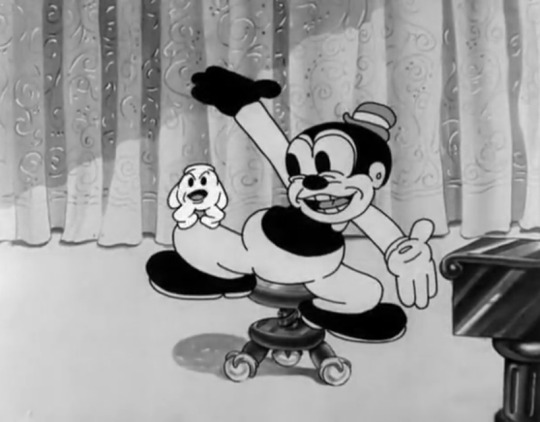
bosko plays some more upbeat bars on the piano, throwing his glove off which slides down the keys and runs back to him, the process repeating. eventually, the glove hops on his knee. bosko urges it on, asking “well, what can ya do?” (parallel to his first appearance in bosko, the talk-ink kid. how the tables have turned!) the glove’s voice is drop dead hilarious. it’s a squeaky violin that sounds almost like a kazoo—no words are being said, but the inflection is perfectly understood, the glove insisting “i dunno/i don’t wanna!”. finally, bosko suggests that it sing mary had a little lamb, and it does, giggling and leaping back on his hand. bosko finishes out the skit with a few chords of “shave and a haircut”.

next, bosko decides to do a tapping routine, looking at the audience instead of his feet. gotta applaud him for trying! he loses his balance and falls, and the audience laughs at him. he limps back over to his previous spot and gives it another go, with the same results. gotta admire his perserverance. i’m curious as to who animated this. bob mckimson maybe? i think was after his car crash.
^^ that sounds weird, but it’s true! bob mckimson got in a car crash sometime in the early 30s, i think around 1931 or 1932. he was (thankfully) fine. he was actually MORE than fine. before the crash, bob would come into work and take a nap before lunch (which, according to bob clampett, rudolf ising did the same thing too, which is probably how he got away with it). after lunch, he’d churn out a TON of animation, more than what the other animators who worked all full hours did. after the car crash, something must’ve happened to his brain. he didn’t sleep anymore, his animation was extremely professional and calculating, he didn’t even have to do rough sketches first, he was just that good. i love his animation work under tex avery and bob clampett, more than i love his directorial work in all honesty. he was insanely talented, and also credited for really nailing down bugs’ look starting with tortoise wins by a hare. you can read bob clampett talk about him here. (with all the corrections made, since clampett is notorious for getting details wrong)

anyway. point is, the animation looks great! cut to honey, who sings “was that the human thing to do?” in a big, belty, raspy voice and later doing a hilarious impression of greta garbo. i love her saunter! it totally reminds me of daffy’s strip tease in the wise quacking duck. greta garbo would also be parodied in a few cartoons, such as in porky’s road race, porky’s five and ten, hollywood steps out, etc. her catchphrase “i want to be alone” would also be parodied in the daffy duckaroo as “i want to be a lone... ranger.”
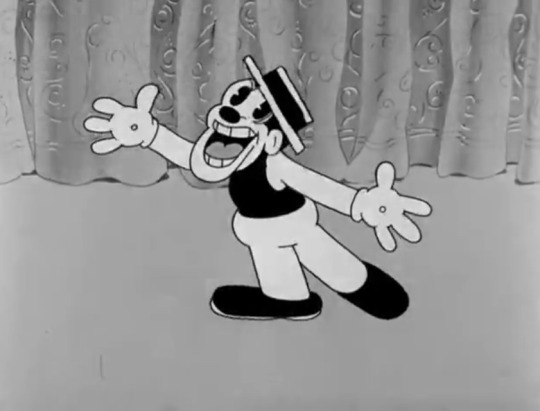
bosko finishes of “whistle and blow your blues away” by doing an impression of maurice chevalier. i love love love all these celebrity references! even if you don’t understand them, they’re funny just to watch. they’re drawn to be funny and sound funny—pales in comparison to what we’ll be seeing when mel blanc comes aboard and the animation becomes more refined, but very entertaining.

jimmy durante strikes again! bosko blows up a balloon to use as his bulbous nose and even remarks “schnozzle! HAAAAAA!” i can’t get enough of that drawing! the uglier and weirder it is, the more i love it! the best caricatures (not of racial stereotypes LOL) are the ones that get a gut reaction out of you. one of my favorite lines from a bosko cartoon that sums this up perfectly is what he says next: “i know i’m not good looking, folks, but that’s one opinion against a million!”
bosko durante receives boos from the audience (and a single cheer from me). he declares “am i mortified! am i mortified!!”. honey cheers him on in the wings and motions for the audience to do the same.
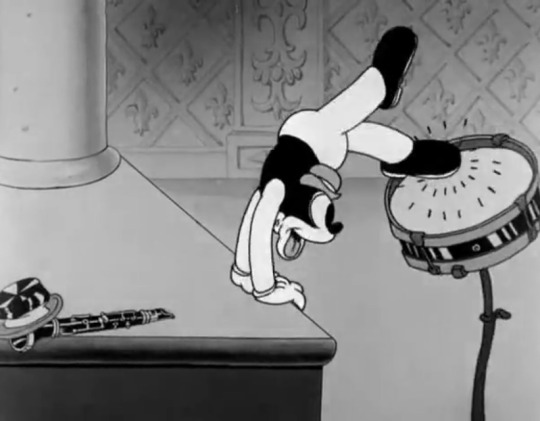
switching from jimmy durante, bosko now opts to do an impression of ted lewis, asking “is everybody happy?” and playing some wonderful jazz through his clarinet. the animation is great! i especially love the detail of him playing the drums with his feet (above). i’m always glad to see the animators having fun with their work. eventually, he loses and balance and falls through the drum. all the instruments are rattled with the impact, but fall back into place as porky bosko bursts through the drum, once again clad in his terrifying yet funny jimmy durante face.

bosko climbs back on stage and switches from clarinet to drum, complete with a franklin d. roosevelt caricature on the side swinging a pint of beer. it’s actually contested whether that’s FDR or ted lewis, who bosko imitated earlier. my odds are on FDR, as honey comes out of the wings waving an american flag, and he’s swinging a pint of beer, aligning with his anti-prohibition status. however, he got inaugurated on march 4th—this cartoon is said to have come out on february 11th according to a few sources, but one lists the release date as april 10th (which would make sense). confusions aside, it’s interesting to note. fade out as bosko goes into the wings.
i adore this cartoon! definitely one of my favorites. even though it has no plot, the gags all hit hard. understanding of the celebrity references or not, they’re fascinating to watch and listen to regardless. the music is upbeat and beautifully jazzy, and bosko and honey are rather endearing as they play off each other. the animation is absolutely beautiful, more intricate than usual. it’s worth a watch! it’s such a feel good cartoon, and the ending with the FDR reference could pose as a symbol that indicates better things are coming. in the long run, it’s true!
link!
9 notes
·
View notes
Text
SCREW TO THE LIMIT - 6
Original title: Vite sull’orlo del baratro.
Prompt: prostitution, sacrifice, danger.
Warnings: A.U., mention of sex content.
Genre: angst, drama, family, romantic, smut.
Characters: Penelope Garcia, Luke Alvez, Luke’s son, BAU team, others OC, Derek Morgan.
Pairing: Garvez.
Note: oneshot.
Legend: 💏😘😈👓🔦🐶👨👩👧👦💍🎲🎈.
Song mentioned: none.
Screw to the Limit- Masterlist

GARVEZ STORIES
PART 6
She lets herself be led into a hotel room with few traces to understand what kind of person he is wearing. Even profilers like Luke would struggle a lot to draw a pattern based on so little. Here, she thought him. That's no good. She tries to focus only on physical sensations. The rough hands of the man holding her wrists, for example. But it immediately brings to her mind when Luke had done it (again!). And from there she can’t help but find differences. One was rough but sweet, one pushed her towards what she herself wanted; the other is not in the least interested in her, for him she is only an object, he hasn’t even asked her what her name is. For him she is a victim, a mark on the wall next to many others.
The hands of this man are also wet with sweat, a sign that he is excited. With one hand he stops both her arms, while the other is on her back, like a gun; not to make her believe he has a similar weapon, just for the sake of hurting her.
The room where he forces her to enter is dark, unlike the rest of the place. She gropes her way, going to crash several times against something, probably furniture and he seems to enjoy it. Then she ends up knees on something else, hard, wood presumably, and he senses that it is the structure of a bed. The man stops right behind her, on her body and she clearly feels the erection between her buttocks. He's much lower than Luke.
She swallows. Now fear, even terror can be a useful factor in its purpose. It will help her look like a poor little bitch in trouble.
She drives away, biting her tongue until it bleed, the images of what the bastard could do before she can react. And her fantasies (her nightmares) seem to come alive, get out of her head, because now his hands leave her wrists to start an exploratory journey, from the hips up and then go inward and violently touch the breast. There, if she needed to understand it, Penelope fully realizes the diversity of the gestures of the Latin federal with respect to those of this pervert. A slight difference, which weighs a quintal.
Now she also uses Luke in her favor. She imagines that it is one of their moments, he liked to dominate and her too, but she liked being dominated by him; she strives to seem at least excited. The deception must be perfect, because if he recognizes her, then yes that she is fucked.
She has changed so much, since the last time they saw each other. She had benefited from the pregnancy. At this thought she even manages to smile, while that man hand is directed towards her lower abdomen. But it's a bad smile.
A second before he puts his filthy fingers in her aperture, she catchs his wrists, nailing her nails into his flesh hard. They start fighting, but the woman soon manages to immobilize and handcuff him. So, she throws him on the bed, then looks for the switch and finally the light. She jumps in turn and puts a heel in his private parts. Then she pulls off the wig, revealing a thick blonde hair. And she smiles again. -Surprised? You didn’t expect to see me again. Did you think I was dead? That I had killed myself?- she shakes her head, she laughs in a strange way. This time the killer is the terrified one. -You would have liked it.- another break for make effect. -I am your worst bankruptcy. You were still a beginner and I managed to get away.- she presses a little more and hearing him moaning in pain. Perfect. -Whatever the process goes, you can’t ever spread your DNA anymore.- she gives another ht, like to be sure. -You never were a man of many words, eh Carl?- without stopping, she pulls out a phone from the other shoe. -The smoothie has been completed.- she only exclaims, that smile fixed on her lips.
LPLPLPLPLPLPLPLPLPLPLPLPLPLPLPLPLPLPLPLPL
They always had a sort of connection. One knew when the other was sick and vice versa. This is why the woman is not surprised when the child starts screaming, raising her hands in the air and less than a second later she hears that particular ringtone. As soon as she hears her voice, all the tensions of six months vanish.
She looks at the little baby, who is smiling, and imitate her.
Mom is coming home.
TAGS: @arses21434 @kathy5654 @martinab26 @reidskitty13 @jenf42 @gracieeelizabeth27 @silviajajaja @smalliemichelle99 @charchampagne14 @thinitta @myhollyhanna23 @garvezz @mercedes-maldonado @shyladystudentfan @cosmicmelaninflower @avengerquake123vanuusims @kiki-krakatoa @unlikelyfarmlamppurse @pegasus-scifichick @ianmillkovichgallagher
#garvez#criminal minds#cm#penelope garcia#luke alvez#luke x penelope#penelope x luke#alvez x garcia#garcia x alvez#BAU team#derek morgan#A.U.
7 notes
·
View notes
Audio
When watching the Bob Dylan documentary "No Direction Home", I was struck by something Dylan said when talking about Woody Guthrie. He said when he first heard Woody, he was impressed by his sound, the sound of the records. He goes on to talk about the lyrics of the songs, but his first mention was the performance. In the many years I have followed Bob, I have had numerous people tell me that they like his songs, but not his voice, that they like to hear others sing them. I have never agreed with that, I believe Dylan is his own best interpreter. The same can be said for Woody, generally regarded as a great songwriter, but overlooked as a performer. For me, a good counter argument is Ramblin' Jack Elliott, who slavishly imitated Guthrie early in his career. Jack doesn't do a lot of political material, which is what most remember of Woody, but he has never moved away from the rough and tumble sound of Guthrie's originals. I once heard Jack say that he hated to hear others sing Woody, because they try to hard, He goes on to say "it's not opera." Jack’s take on “Buffalo Skinners” is an epic example.
youtube
It's well known that in his early days in The Village, that Dylan mimicked Jack as much as he did Woody, and I believe that it was the performance style of Guthrie that impressed him them both the most. Back in the nineties, Smithsonian Folkways Records put out a four part set on Woody, each volume focusing on a particular aspect of his career. Volume 2 was titled "Mule Skinner Blues" and features Guthrie doing traditional and country stuff. I've always loved the disc, and one reason is that Woody as a poet is absent, he is doing material that was around before he came on the scene. On a couple of numbers, he even plays the fiddle. In this context, Woody is part of a tradition of early hillbilly recordings, standing apart from others, but still fitting into the genre. If you listen to this, and then the Carter Family, the link is plain. It's also important to note that although his version of the title track may be inferior to Jimmie Rodgers or Bill Monroe, it was his take on the song that was first heard by folkies, influencing many of the subsequent versions. Much of the stuff on "Mule Skinner Blues" is taken from sessions done in the spring of 1944, well oiled affairs where Woody is joined at times by Cisco Houston, Sonny Terry, Pete Seeger and Bess Lomax.
youtube
Some of the material is sloppy, sounding like an unrehearsed, drunken hootenanny. I believe, however, that it was that sound that ends up being so influential. These recordings were not carefully prepared, but rather impromptu performances of songs they came up with during the sessions. The very nature of that kind of playing gives the records an immediacy that rails against professionally recorded music. There is an intimacy about a performance that was so spontaneous that it will literally never sound that way again that gives these cuts their power. It's obvious that this is the sound the young Bob Dylan and so many others have been influenced by for all these years. Guthrie always had a lot to say, but it's important to pay attention to the way he said it, which was also influential. Woody may have just been doing these sides for the studio fee, but in the process, he ended up making timeless music.
youtube
0 notes
Text
The Best Films of 2017, Part II
Part I can be found here. I should have mentioned the films I haven’t seen, which include BPM; Faces Places; The Square; Coco; Thelma; Last Flag Flying; Roman J. Israel, Esq.; Wonder Wheel; Jane; and I, Daniel Blake. Long-time AHOLs also know that I’m in the fifth year of a self-imposed five-year break from superhero culture, so I haven’t seen Logan or Thor or whatever else. With that:
ENDEARING CURIOSITIES WITH BIG FLAWS
87. The Great Wall (Zhang Yimou)- Zhang Yimou's The Great Wall has a lot in common with Wong Kar-Wai's The Grandmaster. Both are high-concept international co-productions that bear just enough of the filmmaker's signature but feel unfortunately cut to ribbons in the editing room. Computers have made us all a little worse at our jobs, Zhang included, and his spectacle is achieved despite CGI, not because of it. I liked watching a boulder's journey through the stages of being catapulted, even if it eventually landed into a physics-negligent pit of cartoon monsters. By the end, the picture is more bloodless, sexless, and simplistic than a game of toy soldiers, which makes it seem just as child-like. It's a forgettable sort of fun, but it is often fun.
86. The Ghost in the Shell (Rupert Sanders)- A bit more comprehensible than the original but far less beautiful. It's a shame that visions of future exteriors haven't improved or at least changed since Blade Runner. Big advertisements. Got it. (Also, we have telepathic walkie-talkies, but people sleep on the floor?)
There are a few good ideas drizzled around. If people can basically toggle back and forth between languages, why not hire a famous actor who doesn't speak English for one of the supporting roles? Speaking of acting though, Johansson is pretty bad in this, hamstrung by the whole playing-a-robot problem. (She looks as good as she ever has though, which is saying something.) She could have taken some notes from Michael Pitt, who brings some edge and skitter to his cybernetic replicant or whatever they call it.
85. Wilson (Craig Johnson)- It hits the notes that a Daniel Clowes property usually does: misanthropy, formlessness, begrudging acceptance at the end. I laughed a few times and appreciated the huge left-turn at the two-thirds mark, but I didn't think it amounted to much.
84. Patti Cake$ (Geremy Jasper)- Other than the Basterd character, there's nothing really broken about this movie, but I'm selling on anything with double-digit dream sequences.
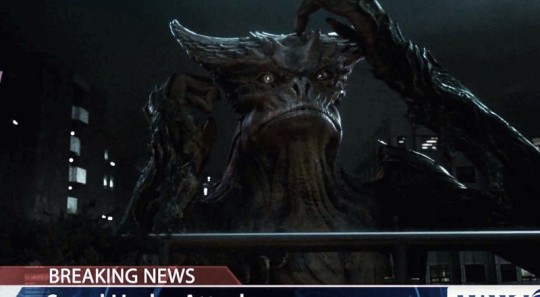
83. Colossal (Nacho Vigalondo)- The ending, both the final act and the final note, went a long way to save what was a tedious sit for me. I appreciate the big swings that everyone took with this budget and material--Sudeikis once again gets to show impressive range. But this is an hour of material stretched to an hour and forty-nine minutes.
82. Rough Night (Lucia Aniello)- Hide-the-body movies never work, but what makes this one disappointing is that there's a daring, original corrective somewhere on the margins. You can tell from the comparatively tame bachelor party or the unexpectedly positive threesome that this movie has refreshing ideas, but both the Machine and TV visuals from a TV director shaved the edge down. No one wants to hear such a thing about a sorely-needed female-driven comedy, but Paul W. Downs is the funniest thing in this.
81. Beauty and the Beast (Bill Condon)- Shout-out to the morons protesting this movie's gayness but not realizing that the original was always an allegory for AIDS.
These live-action remakes are all around the same quality, but this one feels especially bloated, with really dicey CGI. Things get borderline boring in between the musical numbers, but, man, do those numbers hold up. There's the title track obviously, but songs that would be throwaways in something else--"Gaston," "Be Our Guest," "Something There"--are BANGERZ here. The real IP is the music, and Disney is just going to get each generation's Josh Gad to sing them forever.
80. Darkest Hour (Joe Wright)- This movie reminded me of The Imitation Game in the sense that it's a staid presentation with a solid structure that feels cheap whenever it zooms out beyond its back rooms. The grander version of this, which Joe Wright in some ways already made, is probably just as unsatisfying, but it wouldn't have the pinnacle of goofiness that will hereupon be known as The Underground Scene. I’m a bit bored of this type of film.
Darkest Hour might be worth seeing for Oldman's performance, which is a true transformation, absent of any actory vanity but invested with some real myth-making. Churchill gets introduced with just his hat, then lit by just a match, then lit by a shock of sunlight. Oldman is very good in his scenes with Scott Thomas, so it's a shame that her character disappears for a half-hour at a time. The more troubling thing to note is that there are many men in this film who are so English that they can't pronounce their r's. If you catch it eawly, it's a weal distwacting pwoblem.
79. The Fate of the Furious (F. Gary Gray)- Since some of the dumbest stuff is some of the best stuff*, I'm not going to get caught in the web of assessing how much sense The Fate of the Furious makes. But I can say that this entry is the least intentionally funny of the series, and other than "the White girls' soccer team is the Monarchs," it loses some of the class undressing of 6 and 7. From the endless scene-setting to the overstuffed character roster, this is now more of a comic book than a movie, an exercise in being a plot without being a narrative.
*- See: the "make it rain" sequence, Statham swinging the baby carrier through a gun battle, Rock redirecting the missile with his bare hands.
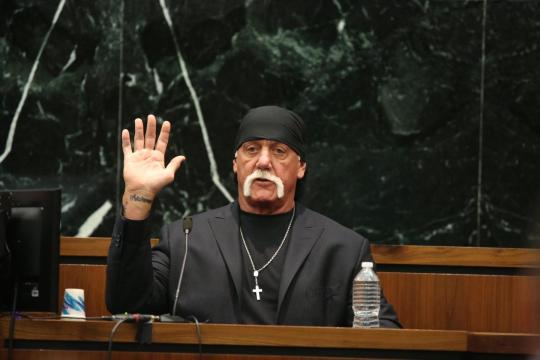
78. Nobody Speak: Trials of the Free Press (Brian Knappenberger)- The first hour, centering on the Hulk Hogan/Gawker case, is compulsively watchable, even if it doesn't shed much extra light for anyone who followed it when it happened. Terry Bollea explaining that his penis is shorter than ten inches while Hulk Hogan's, the character's, is not: That's what I signed up for.
When that case veers into the bizarrely vengeful, pretty much when Peter Thiel comes in, Nobody Speak becomes something else. The final third pits the sensitive, diligent bullpen of the Las Vegas Review-Journal against billionaire liver spot Sheldon Adelson, who bought their paper to suppress it. Then, of course, the doc expands to Donald Trump's vilification of the free press. If that sounds like a straight line, it doesn't come off that way in the film. The Hogan/Gawker stuff, which takes up the majority of the running time, feels unresolved after all the tangents.
77. The Reagan Show (Sierra Pettengill, Pacho Velez)- I'm cringing for the next five years, in which I'll have to judge a movie's success based on how subtly it invokes its mandatory Donald Trump comparisons and allegories. They're coming.
In general, it's kind of sad to see how much more literate people were even thirty years ago, even as they populated a medium we all agreed was low culture. This documentary feels sharp at first, understanding something essential about the way Reagan owned his own persona. With the American Right treating him like some patron saint, it's also helpful to remember how much pushback he got at the end of his second term, for something that would be, like, the fiftieth most controversial thing Donald Trump would have done already. (See?)
When the doc gets to its own fascination with Reagan's Star Wars program, however, it basically loses its thesis. As lean as it is, it still sort of stumbles to the finish line.
76. Beatriz at Dinner (Miguel Arteta)- I appreciated this portrayal of a culture clash way more than I liked it. For a while the characters are highly specific. (The delivery of "It's 6:13, Kathy" made me laugh out loud.) Then the plot turns into "Oh, so we're talking about Trump's America, right?" (See?) Here's a critique that's catty every time: This film has great ideas about class and race if you've never thought about class and race before.
75. I, Tonya (Craig Gillespie)- Oscar is calling...for the fat dude playing Shawn Eckhardt and no one else. If Allison Janney wins for doing the thing she always does over Laurie Metcalf's fully realized human, then it's a huge mistake.
Successful in some of its comedic goals, especially in its depiction of northwestern goons, the shame of the working class, and period detail. (I laughed out loud when I saw the Girbaud tag on Gilooly's jeans.)
Unsuccessful in most of its other goals--if I'm even reading the film correctly in my assumption of those goals. The most obvious one is the slippery nature of the truth, and that idea is handled clumsily. Gillespie goes to great GoodFellas-aping lengths to grapple with perception--having characters break the fourth wall even though there are already voiceovers and to-camera interviews. That talking to the camera comes up a few times in the disturbing scenes of domestic violence, which do humanize the characters because the other elements of the film can't, but they distract the viewer with their blitheness. The most puzzling angle of the film is the Hard Copy reporter, played by Bobby Cannavale in yet another example of his agent not knowing how famous he is. It's a missed opportunity in a movie full of them.
74. It (Andy Muschietti)- I don't get why people went nuts for this. The ensemble avails itself pretty well, despite all the sitcom-y dialogue. (Dialogue that, based on the Stephen King that I've read, is probably faithful to the book.) Some of the visuals nail the distinction between surreal and unreal--my favorite is the children's TV show that sporadically drifts into the murderous.
But the movie just kind of hangs there, all the way to its interminable ending, satisfied with its own literal presentation of events that seem to be metaphorical. As I understand, It--however It manifests itself--represents the death of childhood and the emergence of an adult banality of evil. But the movie engages with that level as little as possible, and maybe that's why people are going nuts for it. This is a scary movie if you're a child, and most of the moviegoing public seem to be children.
73. Before I Fall (Ry Russo-Young)- I mostly watched this because I think Zoey Deutch is a Movie Star, and if I'm going to be there for her Speed, I have to be there for her Love Potion No. 9's as well. I appreciated Before I Fall's brevity, but the premise offers a lot more fun than the film is willing to have. In the end the balance was off: It had to be either more moralistically PG-13 or go way darker. For example, just like in Groundhog Day, the character realizes that she'll live out the same day no matter what she does, and it triggers a nihilistic phase. But rather than going on a shooting spree or stealing stuff from a mall, she just, like, wears a sexier dress and talks back to her parents. Good swing, kids, but I'm waiting for the crazier version.
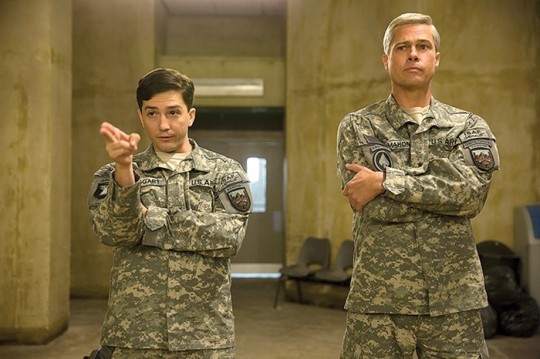
72. War Machine (David Michod)- There are some standout moments in War Machine, many of which are thanks to its impressive cast, but I don't think the film is cohesive enough for me to recommend. I know what Michod is against--counter-insurgency, military hubris--but it's harder to figure out what he's arguing for beyond some sort of level of transparency. The war sequence near the end feels at odds with the tone of everything else, even though it benefits from the Nick Cave and Warren Ellis score.
In a similarly frustrated vein, I feel as if I know exactly who Glen McMahon is, and the script's greatest strength is how sharply it draws him, but Pitt's studied performance adds distance to it. It's as if all of the film's comedic nature is supposed to come from how people revolve around his straight man, and that expectation is too much to put on his shoulders. There's more than a little Bud Turgidson in the voice Pitt affects, but the difference is that, as mean as this sounds, I always believed George C. Scott when he played a smart person.
71. The Trip to Spain (Michael Winterbottom)- Diminishing returns.
70. Downsizing (Alexander Payne)- There's a meta-effect to the structure of Downsizing. Its characters decide to shrink themselves, finding unpredictable challenges in the process, and the film similarly gets more problematic as it focuses further into each of its four legs.
The first part, the outside world, is when the film is at its most cutting and well-observed. It still lays its points on thickly--dude at the bar asking if downsized people should be able to vote, for example--but the questions are worth asking. The second part, Leisureland, the bourgeois subdivision lil' Damon lives in, is more satirical and less satisfying. (I do love that downsizing ends up being such a gauche pursuit though. Payne has always had his finger on the pulse of people with poor taste.) The third part, which takes place in the downsizing slums, is a sharp, unfunny left turn that discards characters but at least develops the protagonist further. And then the wheels come off in Norway. At least we got to hear Udo Kier say, "I do love my boat."
69. Okja (Bong Joon-Ho)- Since Okja is such a unique movie, I feel as if people will overpraise it as a way to brand themselves: Its poster is probably going to be in a lot of dorm rooms. But there's a lot that you have to look past in order to recommend it. In general, I find that Bong's English language work has a bizarre mixture of muddled themes being presented in direct ways. There is some sweetness here--most of it due to the amazingly detailed rendering of the pig--but too much of the comedy doesn't work, and the ending feels a bit easy. I liked most of the stuff with the Animal Liberation Front, and I kind of wish they had been the focal point of the movie.
Can I say, as my main takeaway, that I'm worried about Jakey G? He is so big here, so out-of-tune with the rest of the film, that I blame Bong for not reining him in. At the same time, I keep making excuses for Gyllenhaal, claiming that his parts are under-written, but at a certain point, you have to point the finger at him if there's such a pattern of bad performances emerging. I didn't see Everest, but this is his fourth brick in a row. Help us, Dan Gilroy. You're our only hope.
68. The Killing of a Sacred Deer (Yorgos Lanthimos)- An interesting swing that ends up missing for me. Excepting The Lobster, Lanthimos's works seem obsessed with family dynamics, and he plays some interesting games with this family's perversions. Farrell's character's story about his father dovetails with his somnophilia, which seems to inspire the way his daughter offers herself to her object of affection. From Anna's medical past to Steven's alcoholism, these characters seem to have full lives that have been in motion long before the events of the story.
But I kind of suspect I'm worshiping at the altar of auteurism, and I wouldn't have half the respect or patience I do for this film had I not known who made it. The dialogue and performances are purposefully flat and stilted, thus creating an off, eerie quality before we know why we should be unnerved. But what if the performances are just, you know, bad? The film also creates a premise that concludes in an inevitably unsatisfying way. I don't know what I would have done instead, but I'm not a genius filmmaker who gets the benefit of the doubt.
3 notes
·
View notes
Text
The exposition of Kleist’s essay, “On Marionette Theatre” impinges on a coincidence meeting conversation between the narrator and Mr. C–, an Opera dancer and public figure. Through the subsequent conversation on marionette theatre, Kleist conveys the framework for a larger discussion around Cartesian duality and the relation of consciousness to the body. The difference between the perfect unconsciousness of the marionette against the burden of consciousness placed on the human subject,
The bear’s concentration added to my loss of composure. I alternated thrusts and feints; I sweated, in vain! Like the finest fencer in the world, the bear met and parried each thrust, but he did not respond to feints; (no fencer in the world could have matched him in that). Eye to eye, as if he read my soul, he stood with his paw lifted, ready to fight; and if I did not intend my thrust, he remained immobile.
In Kleist, however, the marionette represents more than a deficiency of consciousness. The dynamic is reversed, in which the psychological completion becomes a resounding failure. The boy who becomes preoccupied with imitating the thorn in the foot is trapped in a cycle of imitation. In fact, the human subject is understood as a physical body impinged by (self-)consciousness, a postlapsarian burden against which the marionette body stands as an example of undifferentiated "perfection." Mr. C- cannot outmaneuver the bear, whose movements are unimpinged by self-consciousness and therefore invulnerable to his psychological feints. The bear responds instinctually, or for Kleist, on the level of pure movement. The body of the marionette, or the "jointed doll," rather than the human, becomes the complement for the perfect consciousness of God. Like a ring, it has approached perfection by the opposite movement, re-emerging on to approach the quality of perfection by not striving for perfect consciousness but excavating it all together. The marionette is possessed by divinity, insofar as it is dispossessed of self-consciousness. It obtains potentiate significance as the human being stripped of consciousness.
Another interesting distinction to note is Kleist’s narrator’s claim that he “had seen him [Mr. C–] several times at an outdoor marionette theater that had been set up in the market square to entertain the common-folk with songs and dances and short dramatic burlesques.” In “Petrushka: the Russian Carnival Puppet Theatre,” Catriona Kelly distinguishes the marionette theatre from the glove-puppet theatre by their performance settings and degree of mimesis. While marionette theatre seeks to mimic human theatre, the glove-puppet theatre does not; moreover, where the marionette puppet aspires towards naturalistic movement the glove-puppet distorts. The marionette theatre was an indoors theatre while glove-puppets performed publicly in streets, fairs, and marketplaces. According to Kelly,
All over Europe, the glove puppet heroes are rude and rough, hard-hitting with wood and coarsely witty in word. The glove puppet heroes are the carnival clown par excellence. Their own bodies are grotesque caricatures of the human body, and at the same time they distort the body of the puppeteer, turning his hands into swollen horrors covered in monstrous carbuncles, so that the only view of the puppeteer seen by the audience is a collection of excrescences.
Mr. C–’s description of the gracile marionette strays notably from Kelly’s historical account of puppet theatre as a raucous, coarse art form; it is apparent, then, that Kleist partakes in some degree of narrative obfuscation, cherry-picking certain qualities from two distinct art forms to characterize his version of marionette theatre. In Mr. C–’s marionette theatre, the marionette transcends human movement rather than simply imitating it. Kelly's description also provides a good starting point for understanding the reflexive relationship between the puppet and its operator, and the transmission of the grotesque property of the puppet onto its operator through the physical toll taken by the hands of the puppeteer.
In "How to Avoid Speaking: Denials," Derrida writes,
In the movement of the same paragraph, a quotation from St. Augustine recalls the simultaneously negative and hyper-affirmative meaning of without (sans): St. Augustine says; “God is wise without wisdom, good without goodness, powerful without power." Without does not merely dissociate the singular attribution from the essential generality; wisdom as being-wise in general, goodness as being-good in general, power as being-powerful in general. It does not only avoid the abstraction tied to every common noun and to the being implied in every essential generality. In the same word and in the same syntax it transmutes into affirmation its purely phenomenal negativity, which ordinary language, riveted to finitude, gives us to understand in a word such as without, or in other analogous words. It deconstructs grammatical anthropomorphism."
The without of apophatic theology transmutes the name itself into the uninhabitable, as it were. This is the essence of the marionette theatre, then, expression of the noun without inhabiting it. Indeed, we can read Kleist’s final paragraphs in “On Marionette Theatre” as a commentary on the apophatic (way of negation) and cataphatic (way of affirmation) theological traditions:
"Now, my excellent friend," said my companion, "you are in possession of all you need to follow my argument. We see that in the organic world, as thought grows dimmer and weaker, grace emerges more brilliantly and decisively. But just as a section drawn through two lines suddenly reappears on the other side after passing through infinity, or as the image in a concave mirror turns up again right in front of us after dwindling into the distance, so grace itself returns when knowledge has as it were gone through an infinity. Grace appears most purely in that human form which either has no consciousness or an infinite consciousness. That is, in the puppet or in the god."
Kleist first starts by describing outlining the separation of IOIOI in the act of contemplation. What is this "grace" that he speaks of? Moreover, Kleist perplexingly presents the mechanical puppet and the God as "human form[s]." What does he mean by calling two distinctively non-human bodies as human forms? What is the common denominator within the concept of "human form" that can simultaneously encompass God and the mechanical puppet? They perhaps are brought into unity as two annihilated forms of self or subjectivity. The puppet which is the material body that has been annihilated, deprived of the ability to sense to become the perfect instrument. Its features are engraved, but remains un-inscribed on the inside; hollowness of meaning. The human "form" of God can only be a gesture, an infinite placeholder for the inexpressible. God can only be approached in human form by a that which has fully stripped itself of subjectivity, that has reached a point of self-annihilation so perfect that it approaches full instrumentality – something approximating a mechanical puppet. The puppet and god are thus prepositionally linked by 'with' rather than conjunctively linked by the ‘or.’
In this way, the puppet becomes the figure for which the infinitely impotent substitution of subjects in the trilogy (Molloy, Malone, Mahood, all similar enough to resemble permutations of each other) overlap each other. In The Unnamable, the last novel in the trilogy, the negation is expressed in the title itself – giving name to the unnamable.
0 notes
Text
Seiko Oomori - kitixxxgaia - Review
If you’ve read this blog before, you probably have a pretty good idea of my completely unbiased admiration for Seiko Oomori and everything she does. “Unbiased”.
So let’s just get to it. Less than a year, by about two weeks maybe to be precise, Seiko Oomori follows up her critically acclaimed major sophomore album (fourth overall) TOKYO BLACK HOLE with something even bigger, even more political, even more honest, and even more ambitious. I’m going to start off by changing my previous opinion. TOKYO BLACK HOLE is like an 8.5 now. Stay with me, here now and buckle up; we’re going for a ride, my friends.

The same week the United States got unleashed with the marvel of Drake’s More Life – a notably emotional return to form that also doesn’t shy away too far from the newer territory Toronto’s first celebratory hero has been invading – Japan was hit with something similarly parallel. Seiko Oomori gave us her fifth album kitixxxgaia on March 15th. Just like Drizzy, Seiko has given us an equally emotional experience, that still covers her recent sounds while almost giving us a slight return to her punk roots save for the general lack of an obvious acoustic guitar in most of the mixes (though it’s worth noting that it’s still there, just buried in the mix; I’ll get to why such a jam-packed mix actually works in a minute).
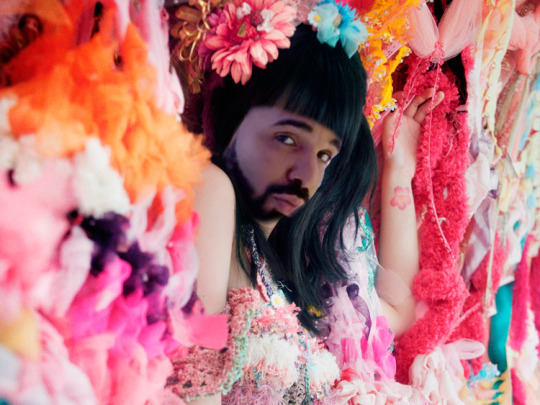
It’s amazing to see that the west and the east were both delivered promising projects by two of their biggest masters of music and emotion. It’s amazing to see just how far some shitty kid from Koenji has come in just five years since her official debut PINK in 2012. It’s amazing to think that that’s six albums if you count PINK, seven if you count the mostly self-covering Pink Tokarev album of 2015, which was otherwise an off-year for everyone’s favorite singer to imitate.
The only word I can describe how kitixxxgaia sounds with is “big”. And several other adjectives. Maybe “gigantic”. Maybe “colossal”. It’s a fucking huge album, pardon my French. This is potentially Seiko’s first Ringo Sheena-level album (let’s just forget that SUNNY happened for a minute). There’s a lot of religious imagery and a heavy aesthetic. I’d highly suggest on your first listen, you watch the music videos for every song that has one. So start with the “Dogma Magma” video, then the “Hikokuminteki Hero” video, listen to “IDOL SONG” normally, then when “Gutto Kuru Summer” comes along, watch that video too. And so on.

kitixxxgaia is heavy in its use of a very specific aesthetic, which takes influence from Christianity (and a hint of Mexican-style Christianity at that), weddings, quite a bit of Dadaism, and it’s all absolutely drenched in shades of pink and lighter blues. It’s the kind of album that’s best to be experienced both by listening and watching, as I said before. There are heaps of promotional images that came along with the album and the original “holy trinity” singles that lead up to its release, and I’d suggest maybe even just looking through those around Twitter and wherever else you can find them (maybe I’ll compile what I can find and make a post later this week) while you listen to the songs that aren’t accompanied by music videos. It’s the kind of multi-media work that could induce a sensory-overload in someone with synesthesia, like myself.

Now before I even get into the music of it, I want to point out the name of the album itself. Just the name kitixxxgaia (say it in English how you want, I generally say “Kitty Gaia”), much like her lyrics, takes some wordplay. In Japanese, the word “kichigai” - short for “[anta no] ki ga chigaimasu”, though nobody would ever say it that formally - is essentially the closest the Japanese language can get to the level of offense that words like (cover your children’s eyes) “fuck” or “cunt”. It doesn’t mean the same thing, but it’s that sort of level of offense, though deeper seeing as Japan is culturally much more introverted than we are over here.
Kichigai could loosely be translated to “you’re fucking crazy, man; you’re out of your goddamn mind.” Not in like a “woah dude that’s a fucking siiiick tattoo of a wolf” kind of way, though. It’s an insult, not a term of endearment. Adding the “a” to the end, Seiko turns it into “kichigaia” (キチガイア). After a day or two, she officially changed the name to romaji, now calling it “kitixxxgaia”, censoring it (possibly for management, cultural, and radio airplay reasons, but we don’t know specifically) by making it English and with three x’s in the middle. This name, to me, holds two simultaneous meanings, again, much like her signature style of lyricism.
The “kiti” could be interpreted as “kitschy”, a word referring to style in poor taste, much like our girl Seiko’s aesthetic. The word “gaia” is the personification of our planet Earth in ancient Greek texts. So it’s a “Kitschy World”.
“kitixxxgaia” in its original meaning, “Crazy Fucking World”.
Now to the music: Seiko has never let us down with a strong opener, and this might be the most in-your-face, unexpected opener, titled “Dogma Magma”. “Come on up to the emotional stage!” she blurts out before a gong bangs in your face; the remainder of the measure in silence before another hits with a choir on top, just underneath a piano playing downward arpeggios, and below that, some intricate string work, each instrument holding its breath. After the four bar intro, we crescendo up to the main song. Enter a not-quite shibuya-kei type beat – syncopated and staccato-like drums underneath a jittery, major piano progression. Behind it all is Seiko’s voice distorted, seemingly having a conversation with God.
As the filter cuts off, Seiko enters with some of her most provoking, forward lyrics ever written: (rough translation by yours truly): "Once upon a time there was something other than [just] male and female. Once upon a time there was something other than [just] white, black, and yellow [people]. Once upon a time there was something other than [just] yes and no. These things had always always existed, but it was then instead decided that they didn’t [exist].” she sings, touching on the recently hot topics of gender, race, and consent.
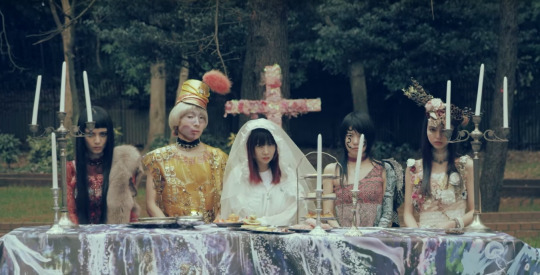
She continues “When I opened my eyes I was Japanese. I’m a goddess but I’m too uncomfortable in this inconvenient body to go outside without makeup on.”, a clear reference to body positivity clashing with self-esteem issues, and likely even cultural pressure in Japanese society. “Dogma Magma” has cuts into a more punk style chorus, reminiscent of “Magic Mirror”. “What will you do during the revolution? Just one heart? Fuck you, fuck [you] all, because this is war!” There she is. That’s the Seiko we know and love.

Track three is of note because it sort of takes me back to when she used to advertise herself as an idol during the Zettai Shoujo era for extra shock value. A clever parody on idol music and culture, “IDOL SONG” could almost pass off as a generic denpa song à la Band Ja Naimon!.
“JI・MO・TO no Kao Kawaii Tomodachi” (roughly “JI・MO・TO’s Cute-Faced Friend”) is certainly one of her most out-there songs, with a catchy, sugary hook, an almost rap verse not too different from what she did with “Zettai Kanojo”. It’s light, it’s bouncy, and it’s really good. This whole album is really good. Good. Good. Good. Good. It’s good music (Cruel Winter, when? I need answers, Kanye!).

Speaking of rapping, two songs later, Seiko gives us the ultimate collab for this generation of J-pop. Much like Ringo Sheena and Utada Hikaru’s “Nijikan Dake no Vacation” (roughly “A Vacation For Just The Two Of Us”), “Chikyuu Saigo no Futari” (roughly: “The Last Two People on Earth”) opens up eerily, with a huge texture and an oozing sub bass that launches into this groovy, dark, rhythmic masterpiece. Seiko begins “Dora-chan, warmest welcome to the 21st century, where mass production has made humans more like robots. Justice is brought by violence, the death penalty is given immediately unless you’re cute.” Seiko is soon interrupted: “I’m being forced to be stupid, these frames in front of me are out of my league. Fuck you, guidance! In my head, I’m punk.” Is that voice DAOKO? You bet your ass it is, and she is spitting that truth all over this track.

God there’s so much more to cover for this album but I really don’t want to ruin too much of it by blabbing on. Up next, continuing with the album’s religious themes “Pink Methuselah” brings a familiar sound with a twist – once it kicks in, it’s very clearly Kenta Sakurai (ex. Izukoneko, current Maison Book Girl, TOKYO BLACK HOLE’s “SHINPIN” producer) behind the producer’s chair on this one, but unlike “SHINPIN” from Seiko’s previous album, it’s not just another Sakurai song. It’s very clear how much Seiko added on top of what he did, and it’s like the perfect blend of both of their signature styles.

The album also features a menacing, full-piano self-cover of °C-ute’s “Mugen Climax”, a song that Seiko wrote for the extremely popular Hello! Project group. Now, she’ll never avoid Ringo Sheena comparisons – after all, Oomori’s debut album Mahou Ga…’s artwork pays direct tribute to Sheena’s legendary 2000 album Shouso Strip’s artwork - but what hearing this self-cover (which makes °C-ute’s version almost unlistenable) makes me want is a self-cover album from Seiko once she garners enough writing credits, much like Ringo Sheena’s Utaite Myouri.
The thing here about kitixxxgaia is that the album finishes off differently depending on the version you have. There are three versions: Dogma, Karma, and Gaia. Every version comes with a second “disc” that’s a DVD/Blu Ray; Dogma comes with a live Blu Ray of ZEPP Tokyo stop of the Tokyo Black Hole Tour, Gaia comes with live audio of that same show as well as a DVD of all of the album’s music videos, and Karma comes with a live DVD of a few different shows from last year. Each version also has a key difference to the main album – the final track is different.

As my personal recommendation, Dogma is the ideal version. Karma and Gaia finish off with new songs, but Dogma closes out with an acoustic re-recording of the Zettai Shoujo single “Kimi to Eiga” (literally: “Movie With You”). Since the closest thing we get to ‘acoustic’ on kitixxxgaia is “Mugen Climax” and “Orion Za”, this is a necessity to the album’s closure and really puts into perspective just how far Seiko has come since her humble beginnings.

The Karma song is called “Ramen no Hanashi” (literally “Ramen Conversation”) and the Gaia song is called “M”. “M” is another piano song, cutting in at just over 6 minutes. “Ramen no Hanashi” also does a similar job to “Kimi to Eiga”, being a full-acoustic track, and it’s a bonus that it’s a new song as well, so if you’re looking for a fully new experience or you’re not familiar with the Zettai Shoujo classic, maybe the Karma version is more for you. Either way, it’s a really nice way to end the album with some retrospect.

IDOL iS NOT DEAD gives kitixxxgaia a perfect 10/10. 11/10. Screw it. Whatever. It’s so goddamn good, just stop reading and go listen oh my god
13 notes
·
View notes
Text
Galdrar (FE Rarepair Week Day 1: Blessed/Curse, Tibarn/Reyson)
Title: Galdrar
Author: legault/pinksnowboots (fic blog)
Warnings: Mentions of violence, non-explicit sexual content
Words: 3306
Summary: Most beorc and laguz are under the incorrect impression that because herons are beings of order, and beautiful to boot, they cannot harbor darkness inside of them. Tibarn used to labor under that same misapprehension, but that was before he met Reyson.
AKA a more serious take on the infamous “ I had to tie him [Reyson] down to a bed to keep him there” line.
Written for Day 1 of @ferarepair-week2k17 for the prompts blessed/curse. Thanks so much to the mods for holding this event and to everyone contributing to it, I’m incredibly pumped about participating!
Also read on AO3!
Most beorc and laguz are under the incorrect impression that because herons are beings of order, and beautiful to boot, they cannot harbor darkness inside of them. Tibarn used to labor under that same misapprehension, but that was before he met Reyson.
Reyson is so beautiful that sometimes it hurts to look at him, but even that pain is only the merest shadow of what Reyson can truly do.
Tibarn is among those who pluck the last remaining herons out of the burned wreckage of their home. Lorazieh is unresponsive and barely breathing. Reyson, on the other hand, is very much alive and looks like he survived the fire by absorbing it, eyes blazing and wings covered in soot, vowing that whoever wrought this destruction on him and his people would face the same destruction in return.
Reyson insists on flying with them rather than being carried like his father and sister and glares at anyone who suggests otherwise. Tibarn lets him try, watching him rise erratically, looking for all the world like an avatar of vengeance.
He makes it several feet before his strength gives out and he begins to plummet through the air, looking for all the world like a particularly angry fallen angel.
Tibarn catches him well before he hits the ground. Reyson is incredibly light, so light that he almost feels unreal, like he lacks something grounding him on this mundane world.
Reyson’s eyes flutter, exhaustion and grief beginning to creep in as his adrenaline runs out.
“I did not ask you to do this.” He rasps, eyes flashing angrily at Tibarn and at his own helplessness.
“I know. But I am not going to let you fall.” Tibarn tells him, unsure if he is referring to saving Reyson from crashing to the forest floor or making a promise of a much wider scope.
“Chief!” One of Tibarn’s men calls to him. “What are we going to do with the herons?”
Tibarn looks at Lorazieh, barely clinging to life. He looks at the ruins of what was once the brightest and most peaceful of the laguz kingdoms. He looks at Reyson in his arms, struggling to maintain consciousness, skin burning with rage and grief.
“We’re taking them home.” Tibarn declares, sending a wave of mutters through his troops. Tibarn is still a relatively new king, and taking in refugee herons is a bold move, especially given that Phoenicis is not particularly friendly to outsiders.
“My home is gone.” Reyson murmurs, as if speaking from a dream.
“Yes.” Tibarn says, tightening his arms around Reyson. Even if the truth is harsh, it is better than telling a lie. “But I hope that will not always be the case.”
Reyson does not reply, having finally slipped into unconsciousness.
Reyson eventually becomes accustomed to Phoenicis, but Phoenicis never truly becomes accustomed to Reyson. Lorazieh fits their image of what herons are supposed to be like: beautiful, docile, and quiet. Although Reyson is beautiful, he is willful and imperious. He orders Tibarn’s servants around and wanders around the country without regards to his own safety, requiring several of Tibarn’s men to serve as escorts. He observes the customs and speech of hawks and tries to imitate them, sometimes injuring himself in the process. He even speaks frankly to the the king himself, adressing him as an equal and not as a king. Reyson may be a prince, but his kingdom is gone, and to the citizens of Phoenicis, it looks like he is ungrateful for the help that Tibarn has so graciously provided.
Reyson is grateful, but he does not show it in words. He shows it by slipping phrases borrowed from Tibarn into his own speech, by trailing Tibarn and watching as he spars with his men, by attempting to grow stronger at the expense of his own body, unsuited as it is for a lifestyle of meat-eating and vigorous exercise.
“You don’t have to be a fighter to be valuable, Reyson.” Tibarn tells him, for the umpteenth time. “Everyone has their own strengths, and none are more valuable than the next.”
“Perhaps in theory. But physical prowess is the language of battle.” Reyson replies, in the tone that Tibarn has come to know means that he will not be budged.
“That may be, but if you continue to push your body to do things it was not intended to do, you’ll be no use to anyone.” Tibarn says. “Besides, you don’t need to worry about battle. For that, you have me and all of Phoenicis behind you. If you ever need someone roughed up, just say the word and I’ll take care of it.”
“That’s not the point!” Reyson says, voice uncharacteristically shrill. “I owe you a great debt for saving my life and taking my family and me in, and I will not ever be able to repay it if I have you fight all my battles for me.”
“Are you still going on about that debt thing? I’ve told you, you don’t owe me nothing. And even if you did, you’d have paid it ten times over with your companionship.” Tibarn says. “If you feel like you need to do more, you could try singing for us once in a while.”
“I do not sing any longer.” Reyson says, voice suddenly hard. “Besides, I have other reasons for wanting to grow stronger.”
“Is this about revenge?” Tibarn asks cautiously.
Reyson says nothing.
Years pass, and Tibarn begins to hope that perhaps Reyson’s soul is beginning to heal. He retains his fiery temper, but vengeance is no longer at the forefront of his mind. He spends his days with Tibarn and does not speak of debt. Although he still does not sing, he smiles often and even begins to laugh, and when he does he seems to radiate light.
(“Why don’t you sing anymore?” Tibarn asks. “I thought herons were famous for their song.”
“Herons are creatures of balance, and the power of the galdrar comes from the balance in our hearts.” Reyson says. “But I have not felt balance since the destruction of Serenes Forest. If I were to attempt to sing a galdrar now, I do not know what sort of destruction it might bring about.”)
Tibarn cannot imagine life without him, and he often wonders if Reyson’s heron empathy means that he knows the immense and overwhelming fondness that Tibarn holds for him.
Then one day Reyson disappears, and Tibarn’s world seems to spin off its axis. Reyson leaves a note saying that he will return, but he does not say when, and although Tibarn trusts him, he cannot shake his feeling of unease.
Then Nealuchi comes and tells them what has happened: Reyson had been sold to the Duke of Tanas by Naesala, king of Kilvas and Reyson’s supposed friend. Perhaps the king of Kilvas had planned to rescue him, but it has become irrelevant because Reyson has escaped on his own.
Tibarn’s restlessness turns to white-hot rage at the king of Kilvas and the duke of Tanas, with a flash of pride that Reyson escaped without needing to be rescued. This news is not good news, but it gives him focus, and a deadly sense of calm. All there is to do is find Reyson, and he will do just that. (And then he will visit Naesala and well...Reyson is not the only one who aches for vengeance.)
They find Reyson in what’s left of Serenes Forest, and suddenly it all makes perfect sense. When he asks Reyson if he is considering singing a galdrar of destruction, he is only seeking confirmation for what he already knows.
“Yes.” Reyson says, fearsome in his resolve. “The humans will pay for the genocide that they have committed against my people.”
“Reyson, this isn’t right.” Tibarn tries to reason with him. “Herons are creatures of balance, and the galdrar was not mean to be used this way.”
“Balance is something I have not had for twenty years now, and I have not missed it.” Reyson says, defiant. “But what I have missed is justice, and I will mete it out while I have the chance.”
Reyson’s eyes flash in a way that Tibarn has not seen since the day he pulled Reyson out of the rubble and Tibarn sees that he has to try a new tactic.
“Reyson, you’re right.” He says. “You’re right. The humans destroyed your forest, and they killed your people, and they deserve any justice that you can deliver. But these humans are not the humans who killed your family, and now is not the time. Come home, and I promise that whatever you want to do to get your revenge, you have my support and the support of all of Phoenicis.”
Reyson looks at Tibarn, eyes boring into his. “Do you promise?”
“Yes.” Tibarn says, promising recklessly. “Anything you want Reyson, I promise.”
Reyson does not reply for a moment, thinking, then finally says. “Alright.”
Reyson flies over to them and Tibarn releases all the tension he did not realize he’d been holding in his muscles. “Thank you, Reyson.”
“Let’s go home.” Reyson says, and Tibarn’s heart leaps because Reyson has never referred to Phoenicis as home before.
Somehow before they return home, they discover Reyson’s supposedly-dead sister and get caught up in a continent-wide war. But more importantly, Tibarn finally gets to hear Reyson sing, and it is more beautiful than he could have ever imagined. When Reyson and Leanne sing, the forest literally comes alive, color and life returning to what was once barren and dark, and Tibarn feels his heart swelling as he watches the plants grow.
One war ends and another begins, and throughout all the political turmoil, Reyson is his constant in his life, beautiful and stubborn and passionate. He begins to sing again, both in the course of battle and in the quiet moments in between, and he focuses his anger more specifically, onto the beorc who wrong him rather than onto all beorc.
One thing that does not change is his stubbornness. Herons are not meant for war; the chaos of the battlefield saps their strength and their bodies are too frail to withstand more than a single hit from an axe or an arrow. Despite all this, Reyson insists on flying into battle with them, confident that Tibarn will protect him and insistent that he will contribute in whatever way he can.
Tibarn usually does not even try to refuse him, unwilling to patronize him and knowing that it’s a lost cause anyway, but when Reyson passes out hours before they are supposed to meet Ike for battle, Tibarn decides that Reyson is not going onto the battlefield when his body cannot even keep him awake. They have been fighting constantly, so much that even Tibarn, who is usually invigorated by battle, is exhausted, which means that Reyson must be on the bring of collapse.
He pulls a blanket over Reyson and is about to leave when he realizes that if Reyson wakes up, he will follow them. In a fit of desperation, he spies a length of ropes and uses it to loosely tie Reyson’s wrists to the bed, hoping that Reyson will still be asleep when he returns.
Reyson is not asleep when he returns.
Reyson is the first thing that he checks on when he returns from battle, wings still smelling of blood and running on battle endorphins and nothing else. When he enters the tent, he encounters a very awake and very angry Reyson.
“Tibarn.” Reyson says, voice cold and firm. “Untie me now.”
Tibarn does, undoing the knows in a matter of seconds. As soon as Reyson has his hands free, he slaps Tibarn across the face, hard. He can see Reyson wince in pain as his hand strikes Tibarn’s cheek, but Tibarn does not feel any physical pain, only the sting of being slapped by the person whose opinion he valued most.
“What were you thinking?” Reyson hisses.
“I was thinking that I didn’t want you to die today.” Tibarn shoots back, suddenly angry.
“I think that should be a decision for me to make, not you.” Reyson says. “All my life, laguz who were not herons have treated me as someone fragile, who cannot take care of himself and cannot be trusted to make his own decisions. You have never treated me like that.” Reyson fixes him with a cold glare. “Until today.”
“Reyson, you were already asleep.” Tibarn says. “If you were to wake up and head to the battlefield, not only would you risk your own life but you’d risk mine, Janaff’s, and Ulki’s.”
“Well then perhaps you should wake me up before flying into battle!” Reyson shouts, stunning Tibarn into silence.
The air is thicker with tension than it has ever been between them as they look at each other, unsure of how to continue.
Reyson breaks the silence. “Tibarn, I know you mean well. I know you meant to protect me. But what you did made me feel like I am a bauble for you to protect, and that is something that I will not bear. Naesala treated me like a bartering tool when he sold me to advance his own ends. Duke Tanas-” Reyson spits the name, voice dripping with venom. “-saw me as a prized piece of art, to be insured and appreciated. More than anything else, I cannot abide being treated like I am an object, no matter how treasured, and especially not by you.”
“I’m sorry.” Tibarn reaches out, slowly to give Reyson the chance to back away, resting his hand on Reyson’s when he does not back away. “I didn’t realize how it would feel to you, because believe me, I never want to make you feel that way. I was only thinking of how I thought I lost you once, when Naesala-” Tibarn says his name with as much venom as Reyson says the name Duke Tanas. “-sold you, and I couldn’t bear to have that happen again.”
“I know that sometimes I am a liability on the battlefield rather than an asset.” Reyson admits. “But I hate to be left behind.”
“It’s not that I don’t want you on the battlefield.” Tibarn says, squeezing Reyson’s hand. “In fact, I’d rather have you where I can see you so I can personally watch your back. I fight better when you’re around too, if you haven’t noticed. I don’t know if you realize it, but we all rely a lot on you and your galdrar in battle.”
“But no one can fight every battle without rest, and I know that the chaos has been taking a toll on you. I won’t force you to stay back again, but I do hope that you’ll rest when you need it. We need you on the battlefield with us, but we need you alive even more.” Tibarn pauses. “I need you alive even more.”
Reyson suddenly kisses him softly, free hand cupping Tibarn’s cheek where he had slapped it before.
“What was that for?” Tibarn asks when he pulls back. “Not that I’m complaining.” He adds, smile edging into his voice.
“An apology.” Reyson says. “For not realizing that my own reckless behavior was causing you pain.”
Reyson draws back, extricating his hand from Tibarn’s, but Tibarn loops an arm around Reyson’s slender waist and draws Reyson back to him, kisses him long and hard and deep, one hand on the small of Reyson’s back and the other in his hair.
When they pull apart, Reyson is breathing heavily, eyes dazed. “Was that an apology too?” He asks.
“No.” Tibarn says. “It was a promise. Firstly, that I will never try to make your decisions for you again.”
“And secondly,” Tibarn kisses him again. “That no matter what manner of reckless thing that you do, I will always be by your side.”
"Thank you.” Reyson says, catching one of Tibarn’s hands in his own, lacing his slim fingers between Tibarn’s much larger ones. “Thank you.”
They fall into bed together, and as Tibarn undresses Reyson with a sense of almost-reverence, he realizes that it feels like they have always been heading to this place, to the two of them, together in every sense of the word. That it was never a question of whether they would take this step, only how and when.
Tibarn wants to take his time to explore every inch of Reyson’s body, running calloused hands along his lithe frame and peppering soft kisses along Reyson’s even softer skin, but Reyson is impatient, insistently drawing Tibarn back up, kissing him with the un-heron-like fierceness that has always defined Reyson, hands roaming wildly over the vast expanses of Tibarn’s chest.
Reyson moves his mouth to Tibarn’s neck and bites down, hard. Tibarn welcomes the pain, just as he welcomes any sensation, any feeling that Reyson brings.
“You don’t have to be so gentle.” Reyson whispers, lips brushing his ear with every word. “I am not breakable.”
“You are the least fragile person that I have ever met.” Tibarn replies, running his hands through Reyson’s long hair, fascinated. “I’m not gentle because I think I could break you. I’m gentle because I think the world has already brought you enough pain, and I don’t want to ever cause you any more. I want you to know, beyond a shadow of a doubt, that you are loved.”
Reyson’s eyes glint with feeling and he says no more about pain or gentleness, only kisses Tibarn again.
Reyson lets Tibarn press him into the mattress and fuck him slowly and gently, wings brushing Reyson’s with every thrust, eyes never leaving his. Tibarn strokes him firmly with his hands, strong and callused but still gentle, and when Reyson cries out his release it feels like a galdrar, not a dirge of ruin or an aria of rebirth, but something that rings much truer in his ears and in his heart.
“You do know that I love you, right?” Tibarn asks, arms and wings enfolding Reyson in a warm embrace that makes Reyson feel safer than he ever has before.
“Of course.” Reyson says, unable to stop the smile that finds it way onto his face as he feels Tibarn press a kiss to the top of his head.
“Good.” Tibarn says. “I figured you did, what with your heron empathy powers and all that, but I had to check.”
“Actually, it’s not because of my powers.” Reyson says. “I have never told anyone this, but my empathy has always been stronger for negative emotions than it has for positive ones.”
“That sounds frustrating.” Tibarn remarks.
“Quite.” Reyson agrees. “Especially since herons are supposed to be beings of peace. But it does mean that I know that you feel frustrated with me sometimes, but you worry when I am in danger, and that you feel my pain as if it was your own. I cannot feel your love for me directly through my empathy, but your words and your actions have left me with no doubt.”
“And here I was thinking you’ve known all along that I’ve had the hots for you for almost twenty years now.” Tibarn chuckles.
“Tibarn,” Reyson says, voice suddenly serious. “I hope you realize that I love you as well.”
“I guessed as much, but I’m not sure I’m convinced.” Tibarn says, a smile in his voice. “I might need you to say it again.”
“Oh no,” Reyson says. “If you want to hear it again, you’re going to have to work for it.”
Reyson smiles at him wickedly, and it’s such a far cry from the times when Reyson barely talked, would not smile, and would not sing and Tibarn’s heart has never been fuller.
“I think that I’m up for the challenge.”
#ferarepairweek2k17#fire emblem#tibarn#reyson#tellius#Path of Radiance#radiant dawn#tibarn/reyson#fe fic#my fic#day 1#prompt: blessed/curse
39 notes
·
View notes
Text
‘Ossian’s lyricism’: Portuguese women’s translations
The following guest post comes from Gerald Bär of Universidade Aberta, whose publications include many important contributions to Ossian Studies. A fuller treatment of the topic of this post can be found in his article for Translation and Literature, “‘Ossian fürs Frauenzimmer’? Lengefeld, Günderrode, and the Portuguese Translations of ‘Alcipe’ and Adelaide Prata.”
When deciding on the title for my Portuguese translations of Ossian, I had to choose between ‘poemas’ and ‘poesias’. Bearing in mind the remarkable lyrical aspect in the reception and perception of the Ossianic poems, I used the latter word in order to emphasize their emotional and sentimental impact: Poesias de Ossian: Antologia das traduções em português (Lisbon, Universidade Católica Editora, 2010).
What was so appealing about Macpherson’s Bard? Being the last of his race, he presents tragic love of epic dimensions; heroism with nationalistic undertones; scenarios of the ‘sublime’; faithful commitment; passion; premature death; joy of grief. More than enough reasons, perhaps, to explain the female fascination for Ossian in the late eighteenth and nineteenth centuries. Ossian’s popularity becomes only too evident when we consider the many woman translators who contributed to the numerous translations of Macpherson’s publications and their lasting impact. Schiller’s wife, Charlotte von Lengefeld (1766-1826), and Karoline von Günderrode (1780–1806) showed a preference for ‘Darthula’, a short Ossianic poem included in the volume Fingal (1762). The Marquesa de Alorna (1750-1839) translated ‘Darthula’ into Portuguese, making use of Le Tourneur’s version of 1777. In her posthumously published translation she emphasizes ‘the melancholic tone in all of Ossian’s compositions, which mainly derives from the description of nocturnal scenes, lingering with pleasure on sombre and majestic objects’. [i]
By the time Fingal was translated into Portuguese the previously politically controversial national epic had become less polemical through the different emphasis given by its reception abroad and through its musical treatment. Composers such as Désiré-Alexandre Batton (Fingal (1822), Caterino Cavos, (Fingal i Roskrana, a three-act opera, 1824) and Gaetano Solito (Fingal: dramma lirico in tre atti by posto in musica dal Maestro Pietro Antonio Coppola, 1848), applied the genre of romance or scène lyrique to the poems and transformed Fingal into a lyrical piece.
Besides the many woman-translators, the performing of Ossian as a musical piece also contributed to giving the female voice more prominence in the drama and narrative. Clara Novello’s acclaimed soprano made her one of the greatest British vocalists of her time from 1833 onwards. Amongst the most important works created expressly for Novello was Fingal by Coppola, a popular work which was a success for the singer, as she recollects in her Reminiscences:
Several operas have been written for me: “Fingal,” by Coppola, successful; “Cleopatra,” by . . . laughed off the stage; “Foscarini,” by Coen, not bad nor ill-received, and others I forget. A hospitable custom in Lisbon gave us all three or four days’ lodging in some hotel, during which to find permanent abodes for our six months’ stay. [ii]

Clara Novello.
Coppola’s Portuguese libretto of Fingal (‘drama lyrico em 3 actos’, 1851) emphasizes the female role of Agandeca (sic), which gains a disproportionate importance, compared with Macpherson’s text. Coppola’s piece was put on stage on 21 April 1851 in the Royal Theatre of S. Carlos in Lisbon, repeated nine times and brought back in 1864 for another two presentations.
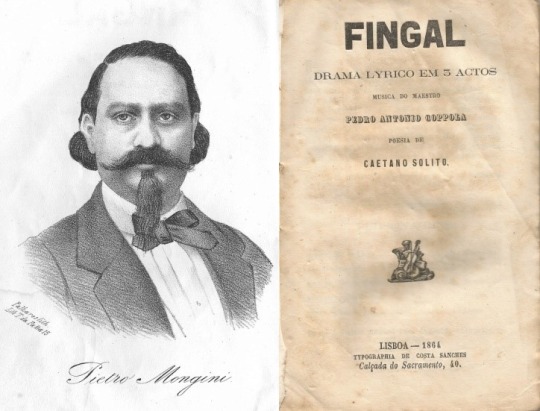
The Portuguese libretto of 1864 with P. Mongini as Fingal.
By that time, however, the leading figures and opinion-makers of Portuguese Romanticism, Almeida Garrett and Alexandre Herculano, had already adopted a more critical view of Ossian. Herculano did not include Fingal in his canon of ‘truly original epics’. [iii]
The first complete Portuguese translation of Fingal was published in 1867 in Porto by Maria Adelaide Fernandes Prata (1826-81), prefaced by two letters of the poets Pinto Ribeiro and Sousa Viterbo:

Porto edition of Fingal (1867).
It is possible that she had been inspired for her work by Novello’s performance or by its reviews. Similar to the Marquesa de Alorna’s Ossian translation, it too is reliant on Le Tourneur, who had used the 1765 Works edition, but it includes neither Macpherson’s notes, nor his Dissertations. In his eulogy Pinto Ribeiro considers Prata’s translated verses to be of the highest harmony, asserting that only a woman can produce real poetry. She can compensate for ‘formal defects with the grateful perfume of love and belief, fanciful lyricism, exquisite sensitivity and sentences of naïve simplicity, which male poetry can never achieve’. As he classifies Fingal not expressly as an epic poem, but as ‘one of the most beautiful little poems of the Homer of the North’ (‘um dos mais bellos poemetos do Homero do Norte’), the translator’s supposed childlike feminine ingenuousness seems to match the attitude expressed in natural and original, ‘formless’ folk poetry. Prata’s versification makes Sousa Viterbo rave about the ‘pure seraphic language’ of the ‘Scottish Homer’, with ‘its dithyrambs’ composed ‘of tenderness, melancholy, softness, delirium and passion’ (Prata, p. 14). These observations by the eminent poet Sousa Viterbo carry the weight of nineteenth-century gender and genre expectations. As already mentioned, the Portuguese Fingal does not include any of Macpherson’s notes, and excludes his and Blair’s academic dissertations. Categorising Fingal as ‘rather a lyrical than an epic poem’, Sousa Viterbo’s contribution to the volume thus relieves the translator of the supposedly masculine task of providing a lengthy literary-historical introduction to Fingal or having to supply academic notes. Its narrative, suspended by songs, and its descriptive elements always giving way to recitative parts, makes him ‘think more of the Romantic genre than of classic style of Antiquity’ (Prata, p. 16).
After appreciating the translator’s excellent choice and the accuracy and elegance of her work, Sousa Viterbo embarks on a detailed and effusively enthusiastic examination of Ossian, ‘the great poet’: ‘He has the roughness of primitive ages but it is this roughness that makes the heart a slave and the intellect a convinced admirer’ (Prata, p. 10). In his nineteenth-century view concerning the subject’s suitability for the fair sex, the poem’s ‘lyrical’ and romantic character, its inherent melancholy, the themes of love and poetry and ‘the female figures, so delicately and sensitively outlined’ by Ossian, makes Fingal perfectly suited for women translators. When Adelaide Prata’s translation came out the Ossianic subject had certainly changed from epic to epigonal, a fact made evident by many imitations and re-mediations (operas, theatre plays). However, despite the somewhat double-edged praise for its female translator, the Portuguese Fingal never saw a second edition, although the first was rather limited, inexpensive (500 réis) and inconspicuous compared to the impressive volume of 1762 (4to., 22.75 x 20cm), printed for Becket and De Hondt, in the Strand.
[i] D. Leonor D’Almeida Portugal Lorena e Lencastre Marqueza D’Alorna, Obras Poeticas, 6 vols (Lisbon, 1844), III, p. 289.
[ii] Clara Novello, Clara Novello’s Reminiscences. Compiled by her Daughter Contessa Valeria Gigliucci, with a Memoir by Arthur D. Coleridge, (London, 1910), pp. 138-146.
[iii] Alexandre Herculano, Opúsculos, edited by Jorge Custódio e José Manuel Garcia, (Lisbon, 1986), V, p. 213.
0 notes